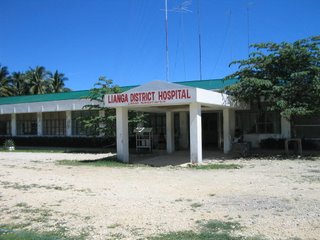 There is something gravely unsettling about the on-going flood of Filipino nurses going abroad in search of higher pay and better economic opportunities. The migration is not, in itself, something new. Over the decades, our nurses have always been in great demand overseas but the sheer volume of them on their way out of the country now and the resulting negative impact this has over the nation's public health care services is becoming alarming.
There is something gravely unsettling about the on-going flood of Filipino nurses going abroad in search of higher pay and better economic opportunities. The migration is not, in itself, something new. Over the decades, our nurses have always been in great demand overseas but the sheer volume of them on their way out of the country now and the resulting negative impact this has over the nation's public health care services is becoming alarming.The Philippines may be running out of experienced nursing personnel but worse than that, it may be also running out of doctors. Many in the medical profession have opted to take the previously unthinkable step of studying nursing in order to escape what many of them see as a bleak economic future for them here. After all, when many doctors, particularly the thousands in the government service, earn only as much as an ordinary, middle-level civil servant, the prospect of a dollar paycheck even as a "lowly" nurse abroad can be temptingly attractive in these times of great economic hardship.
My father, who spent many years as a physician in the public health service, would have been appalled by the present state of the profession he had served so well. When he was still alive, he had always fought and lobbied for better pay and better working conditions not only for doctors but also for nurses, pharmacists, nursing aides and all others working in the local health service. In a time when no doctor would want to work in a rural, backwater town like Lianga, he buttonholed local government officials to subsidize salaries, improve local hospital facilities and even personally recruited physicians to participate in the government's rural health programs. The local district hospital serving Lianga today is a testament to the success of his unceasing crusade to bring the benefits of modern health care to the rural countryside.
But even he would have been helpless in finding ways to help staunch the hemorrhage of medical talent going abroad today. One cannot promote patriotism on an empty stomach and the chance to make real the dreams of a better life and greater financial security cannot compete against selfless and noble altruism.
But to blind ourselves to what is happening is to ignore the gradual destruction of the very soul of this nation. I know many of those who are now in far away lands in search of a better future for themselves and their families. They are family, relatives, friends and acquaintances. They are the among the best, the most productive, the most highly educated of our people and would have been a vital and essential component in our struggle to build a brighter future for the Filipino nation.
 The physician, including all those in the allied medical professions, have always occupied a very honored position in Filipino society. They are looked upon as healers and respected for their important role in fighting disease and promoting health in the community. It is sad to see that even they have been reduced to become like us, mere ordinary mortals struggling to survive on meager paychecks and even meager hopes for a way out of crushing financial hardship.
The physician, including all those in the allied medical professions, have always occupied a very honored position in Filipino society. They are looked upon as healers and respected for their important role in fighting disease and promoting health in the community. It is sad to see that even they have been reduced to become like us, mere ordinary mortals struggling to survive on meager paychecks and even meager hopes for a way out of crushing financial hardship.A doctor friend, who once had a private practice and who later served in the government as well, summed it up for me recently. "My more than ten years of university education," he said, " has entitled me to an income that my small family can barely survive on. Don't talk to me about the dignity of the medical profession and the nobility of public service. I have been there. There is no nobility in poverty." A year ago he graduated from nursing school and eight months later he was in the United Kingdom working as a nurse.
Argue about that.
No comments:
Post a Comment